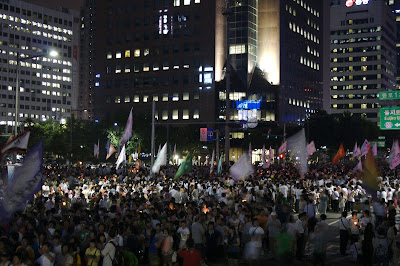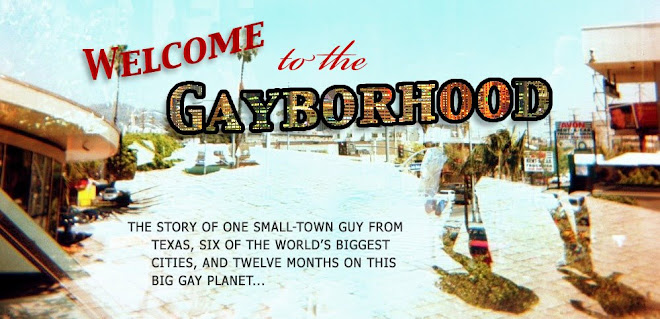Well, that milestone was passed last night in Insadong as thousands of people swamped Saemunangil in the latest guerrilla protest in the popular crusade against American beef imports that began in May.





I've talked to a number of people about this whole upset, and I still don't think I quite understand it, but one thing's for certain - it has nothing to do with mad cow. There are a complex mixture of feelings in Korea regarding the US that I think are fairly representative of much of the world - indebtedness, indignation, admiration, bitterness, respect, and the burning desire to be judged on one's own terms in one's own context.
The crowds actually flooded the precise location where I was to meet up with my friend Eric to scout out the nearly 100 (albeit 6-seater) clandesine gay bars of the northern district. Fortunately he rescued me from the rooftop of a subway station and, with a couple of rice cakes, a bottle of soju, and an underground map in hand, we set off, like scouts into the wilderness of sidestreets and backalleys of this ancient city. It was a lot of work, but a sketchy good time! I can't wait to scope out the insides of some of them this weekend.



5 comments:
Brian, que cantidad de gente, pero por que tanta policia? Los manifestan tes no parecian violentos! Mabel
Police enforcement has been very high all over the city. It's no coincidence that this protest happened the night before president Bush's visit to Seoul.
I had to sit through almost twenty minutes of security screening just to walk by the presidential palace, albeit most of that was the police officer using me as free English training.
i was thinking the same as your mom, that it seemed like a fairly non-violent protest. is protesting a fairly common part of the culture, and seen as a legitamite way for people to demand things of the government? having lived in Argentina for 3 years, angry protests are fairly commonplace and the government has very little constitutional power to stop even the most crippiling of roadblocks or protests, in fact the government often hires people to protest in its favor. are there any soko quirks to the protest of note? any specific chants, slogans, noteworthy behaviours? how are public manifestations viewed? is their a gay pride parade?
I read an interesting editorial in the Korean Herald on the whole affair, that helped to put things into perspective. First of all, as the author mentioned, the ability to protest the government is still rather new in Korea (protesters were suppressed and even shot down during demonstrations in the eighties sparking huge international concern) as is a truly democratic state (most of SK's development has been under rather authoritarian control), and secondly, the way people are connected to one another and able to disseminate information has changed drastically in just the last decade. Korea now and quite suddenly hosts one of the most internet-literate populaces in the world. So the ability to gather together and flex the populace's democratic muscles against issues and actions that a few years ago would have gone unnoticed is exciting and empowering, and is sure to be a force that will truly shape the Korean government for years to come.
The protest was pretty peaceful overall - mostly the standard fare singing and chanting against Lee Mung Bak and the American cows (literally this time!). Security was probably stepped up as the protests have been going on for months with increasing numbers, and on this particular night as it was just before President Bush's arrival to Seoul.
There is a gay pride parade, but it's never very big (the whole thing is still quite new) because the vast majority of Koreans don't want their sexualities revealed. Keep in mind this is a society that is rather unused to talking about sex at all and in which your social status affects your whole life and your obligations to your family are seen as primary concerns.
Post a Comment